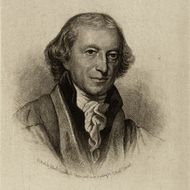William Samuel Johnson
 From Conservapedia
From Conservapedia | Founding Fathers | |
|---|---|

| |
| William Samuel Johnson | |
| State | Connecticut |
| Religion | Episcopalian |
| Founding Documents | United States Constitution |
William Samuel Johnson (October 7, 1727 – November 14, 1819) was a lawyer and politician from Connecticut. He attended the Federal Constitutional Convention and signed the United States Constitution.
Contents
Early life[edit]
Johnson was born in Stratford, Connecticut, to Samuel and Charity Floyd Nicholl on October 7, 1727.[1] As a child, he was homeschooled, receiving private tutoring from his father, Samuel Johnson. He attended both Yale and Harvard, graduating from the former in 1744 and the latter in 1747. Following graduation, he pursued a course of study in law, and entered practice in Stratford.[2] In 1749, he married Anne Beach.[3]
Career[edit]
Johnson spent over 20 years commissioned as a member of the Connecticut colonial militia.[4]
Sympathetic to the patriot cause, Johnson was elected to the Stamp Act Congress, representing Connecticut.[5] However, he rejected his election to the First Continental Congress due to a desire to avoid extreme measures and reach a compromise with Britain. This decision provoked strong Patriot criticism and resulted in the loss of his militia command. Later, however, Johnson wholeheartedly embraced the cause of independence, recognizing that compromise was not a viable option. He served in the Continental Congress from 1785-1787, and enjoyed great popularity and influence with the other delegates.[6]
Constitutional Convention[edit]
Johnson represented Connecticut at the Constitutional Convention of 1787. He played a major role there, arguing powerfully and eloquently for a strong federal government and for equal representation for all states. Towards this end, he was a strong supporter of the New Jersey Plan, and later the Connecticut Compromise.[7] This Great Compromise established a bicameral legislature with a House of Representatives derived from the population, and the Senate equally representing the states. During the Convention he also argued that Ex post facto laws were improper.[8]
Other members of the Connecticut delegation to the Convention were Oliver Ellsworth and Roger Sherman.
Later Political Service[edit]
Fittingly, Johnson became one of Connecticut's first Senators in 1789, taking up service in the chamber he had done so much to help create. He served in this position until 1791. During this time, he also served as the third president of King's College, now known as Columbia University, a position to which he had ascended in 1787. As president, he worked to improve the school's prestige and academic standing while retaining its strongly religious character. When the federal government moved from New York to Philadelphia, Johnson chose private service over public office, remaining in his capacity as president of Columbia until 1800.[6]
Later life and death[edit]
His wife Anne passed away in 1796. A few years later in 1800 he remarried, to Mary Brewster Beach, the widow of his wife's brother Abel.[9]
William Samuel Johnson died in Stratford, Connecticut on November 14, 1819. He was buried in the Episcopal Cemetery.[2]
References[edit]
- ↑ Connecticut Families of the Revolution: American Forebears from Burr to Wolcott
- ↑ 2.0 2.1 http://bioguide.congress.gov/scripts/biodisplay.pl?index=J000182
- ↑ William Samuel Johnson (1727-1819)
- ↑ Soldier-statesmen of the Constitution
- ↑ William Samuel Johnson and the Making of the Constitution
- ↑ 6.0 6.1 http://www.history.army.mil/books/RevWar/ss/johnson.htm
- ↑ Miracle At Philadelphia: The Story of the Constitutional Convention, Catherine Drinker Bowen
- ↑ The Bill of Rights and the States
- ↑ From Loyalist to Founding Father: The Political Odyssey of William Samuel Johnson
| |||||||||||||||||||||||||||||||||||||||||||||||||||
Categories: [Founding Fathers] [American Revolution]
↧ Download as ZWI file | Last modified: 03/05/2023 09:37:21 | 12 views
☰ Source: https://www.conservapedia.com/William_Samuel_Johnson | License: CC BY-SA 3.0
 ZWI signed:
ZWI signed:
 KSF
KSF